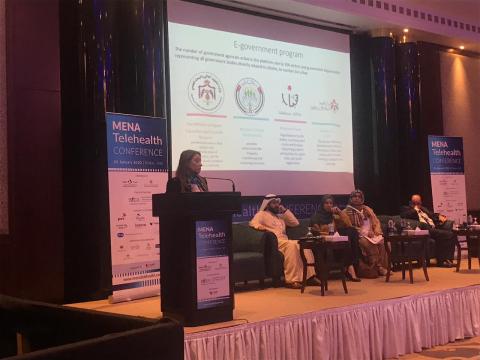

The Secretary-General of the Higher Population Council and the President of the Arab Council for Population and Development Dr. Abla Amawi, participated in a world conference on "Telehealth", held in Dubai today (Sunday), organized by the International Society for Telehealth and Electronic Health.
The aim of the conference, which was attended by representatives from a group of countries worldwide and a number of international experts, was to establish a platform for the exchange of Telehealth field experiences, best practices among stakeholders, how to use this type of care, what are the best solutions and programs, beside discussing the challenges and benefits of applying it in the area.
Dr. Abla Amawi, in presenting "Health Care in Jordan: Challenges and opportunities", stressed that the use of technology in various fields, especially in the field of health care, greatly contributes to making users have access to and update the required information in quality and efficiency, with promote the delivery of health and other services to citizens. Along with the commitment to implement the third Goal of sustainable development, which provides for a guaranteed healthy life and the promotion of well-being for all at all ages.
Dr. Amawi pointed out that health sector in Jordan needs to provide fair access to high quality health care services and control the increasing costs of health care services. noting that among the measures that can be implemented to alleviate these needs is the improved use of existing resources such as (professional staff, health care institutions, and available equipment).
In the field of implementing telehealth programs in Jordan, Amawi noted that the fifth objective of the (2018-2022) Ministry of Health's strategic plan dealt with "increasing the efficiency and effectiveness of digital transformation and technology-based knowledge management", where the Ministry is developing electronic infrastructure through the implementation of electronic transformation projects. The most important of these are the completion of computerization of health centers and hospitals, the development of Ministry of Health’s electronic services, and the purchase of human cadres’ services for electronic transformation projects.
She pointed out that one of the most prominent applications of telehealth in Jordan is to carry out a project in partnership between the Ministry of Health and Cisco, which provided systems that allow safe transmission of information and video consultation. The project is one of the key components of Jordan's telehealth project, which was launched in 2011, and uses high-resolution video and audio technology, connects specialists in the capital Amman with patients in remote areas, and enables patients to access medical consultations through this technology.
Dr. Amawi added that the most prominent applications of Telehealth in Jordan are also the presence of "Hakim" program, launched in 2009, which is considered the first national initiative to automate the health sector in Jordan. The program aims to facilitate efficient, high-quality healthcare delivery through applying it in the patients' health records. In effect, physicians, pharmacists, medical technologists and other clinicians are able to electronically access medical records of patients. As there is a mobile phone application designed by the Family Health Institute focuses on customers, where community health workers use the application to enhance customer awareness about good health services and health risks, recording feedback about client satisfaction with the services provided, and facilitate access to information.
Dr. Amawi stated that the most important benefits of Telehealth were to expand patient access to health care services, improve medical workflow, increase the efficiency of practice, reduce public expenditure in the field of health care and improve the quality of services.
She referred to the challenges facing the application of Telehealth in Jordan, the most prominent of which is the; low financing, technological infrastructure, the need to enhance the efficiency of medical cadres in the field of Telehealth application, the lack of legislation and laws supporting Telehealth in Jordan, and the resistance of doctors and patients regard the conviction that, in the course of treatment, the parties must be present face to face.







